
The Foreign Intelligence Service of the Russian Federation or FIS RF is Russia's external intelligence agency, focusing mainly on civilian affairs. The SVR RF succeeded the First Chief Directorate (PGU) of the KGB in December 1991. The SVR has its headquarters in the Yasenevo District of Moscow with its director reporting directly to the President of the Russian Federation.

Nikolai Yevgenievich Khokhlov was a KGB officer who defected to the United States in 1954. He testified about KGB activities. The KGB unsuccessfully tried to kill him with poison in 1957.

Alexander Mikhailovich Orlov, was a colonel in the Soviet secret police and NKVD Rezident in the Second Spanish Republic. In 1938, Orlov refused to return to the Soviet Union due to fears of execution, and instead fled with his family to the United States. He is mostly known for secretly transporting the entire Spanish gold reserves to the USSR in exchange for military aid for Spanish Republic and for his book, The Secret History of Stalin's Crimes.

Active measures is a term used to describe political warfare conducted by the Soviet Union and the Russian Federation. The term, which dates back to the 1920s, includes operations such as espionage, propaganda, sabotage and assassination, based on foreign policy objectives of the Soviet and Russian governments. Active measures have continued to be used by the administration of Vladimir Putin.

The First Main Directorateof the Committee for State Security under the USSR council of ministers was the organization responsible for foreign operations and intelligence activities by providing for the training and management of covert agents, intelligence collection administration, and the acquisition of foreign and domestic political, scientific and technical intelligence for the Soviet Union.
As early as the 1920s, the Soviet Union, through its GRU, OGPU, NKVD, and KGB intelligence agencies, used Russian and foreign-born nationals, as well as Communists of American origin, to perform espionage activities in the United States, forming various spy rings. Particularly during the 1940s, some of these espionage networks had contact with various U.S. government agencies. These Soviet espionage networks illegally transmitted confidential information to Moscow, such as information on the development of the atomic bomb. Soviet spies also participated in propaganda and disinformation operations, known as active measures, and attempted to sabotage diplomatic relationships between the U.S. and its allies.

Pavel Anatolyevich Sudoplatov was a senior Soviet official in the intelligence services of the former Soviet Union whose career spanned over 34 years in the different intelligence branches of the Soviet Armed Forces.

Iosif Romualdovich Grigulevich was a Soviet secret police (NKVD) operative active between 1937 and 1953, when he played a role in assassination plots against Communist and Bolshevik individuals who were not loyal to Joseph Stalin. This included the murders of claimed and actual Trotskyists during the Spanish Civil War including Andreu Nin Pérez, and an initial, failed assassination attempt against Leon Trotsky in Mexico.

Chekism is a term that relates to the situation in the Soviet Union where the secret police strongly controlled all spheres of society. It is also used to point out similar circumstances in post-Soviet intelligence states such as modern Russia. The term can refer to the system of rule itself, and to the underlying ideology that promotes and popularizes political police violence and arbitrariness against real and imagined enemies of the state.

On 7 October 2006, Russian journalist, writer and human rights activist Anna Politkovskaya was shot dead in the elevator of her apartment block in central Moscow. She was known for her opposition to the Chechen conflict and for criticism of Vladimir Putin. She authored several books about the Chechen wars, as well as Putin's Russia, and received several international awards for her work. Her murder, believed to be a contract killing, sparked a strong international reaction. Three Chechens were arrested for the murder, but were acquitted. The verdict was overturned by the Supreme Court of Russia and new trials were held. In total, six people were convicted of charges related to her death.
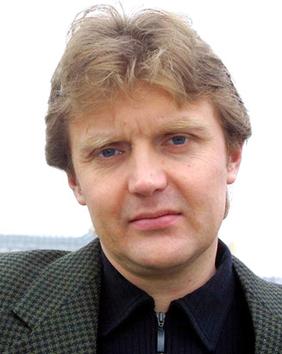
Alexander Valterovich Litvinenko was a British-naturalised Russian defector and former officer of the Russian Federal Security Service (FSB) who specialised in tackling organised crime. A prominent critic of Russian President Vladimir Putin, he advised British intelligence and coined the term "mafia state".

Sergei Nikolayevich Yushenkov was a liberal Russian politician. He was assassinated on 17 April 2003, just hours after registering his political party to participate in the December 2003 parliamentary elections.
Anatoly Vasilyevich Trofimov was a head of the Soviet KGB investigation department. He personally supervised all Soviet dissident cases including Sergei Kovalyov, Gleb Yakunin, Alexey Smirnov, and Yuri Orlov. He was later a deputy director of the Russian Federal Security Service and became a mentor and supervisor of Alexander Litvinenko. He was assassinated in April 2005 by unidentified gunmen in Moscow.
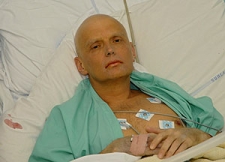
Alexander Litvinenko was an officer of the Russian Federal Security Service (FSB) and its predecessor, the KGB, until he left the service and fled the country in autumn 2000.
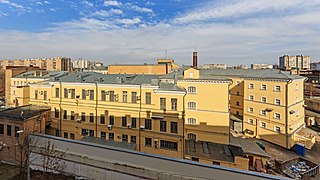
Lefortovo Prison is a prison in Moscow, Russia, which has been under the jurisdiction of the Russian Ministry of Justice since 2005.
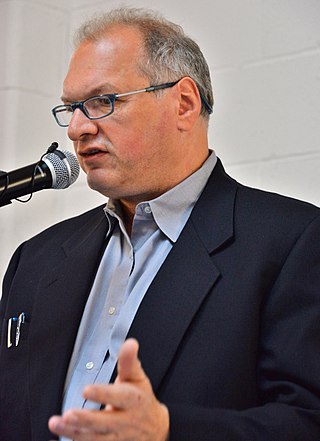
Yuri Georgievich Felshtinsky is a Russian American historian. Felshtinsky has authored a number of books on Russian history, including The Bolsheviks and the Left SRs, Towards a History of Our Isolation, The Failure of the World Revolution, Blowing up Russia, and The Age of Assassins.

Lubyanka Criminal Group is a book by Alexander Litvinenko about the alleged transformation of the Russian Security Services into a criminal and terrorist organization.
Death of a Dissident: The Poisoning of Alexander Litvinenko and the Return of the KGB is a book written by Alexander Goldfarb and Marina Litvinenko about the life and death of her husband, former FSB officer Alexander Litvinenko who was poisoned by the radioactive element polonium in London in November 2006.

The People's Commissariat for Internal Affairs, abbreviated as NKVD, was the interior ministry of the Soviet Union from 1934 to 1946. The agency was formed to succeed the Joint State Political Directorate (OGPU) secret police organization, and thus had a monopoly on intelligence and state security functions. The NKVD is known for carrying out political repression and the Great Purge under Joseph Stalin, as well as counterintelligence and other operations on the Eastern Front of World War II. The head of the NKVD was Genrikh Yagoda from 1934 to 1936, Nikolai Yezhov from 1936 to 1938, Lavrentiy Beria from 1938 to 1946, and Sergei Kruglov in 1946.
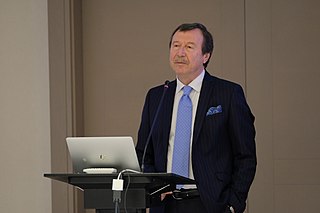
Boris B. Volodarsky is an English historian, Fellow of the Royal Historical Society, specialising in Intelligence History, which he has studied for almost 30 years after having moved to the West, and the history of the Spanish Civil War. He formerly served as a captain in the Spetsnaz GRU, a Russian special forces unit.